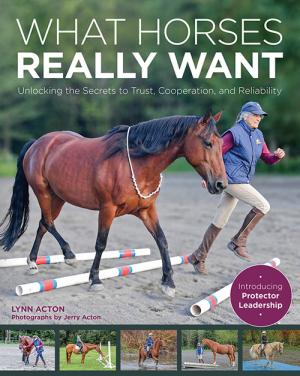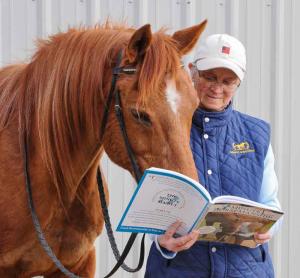What Horses Really Want is Lynn Acton’s first book and another in the genre of developing positive relationships with the horse by understanding the horse’s point of view. It’s about trying to understand why horses behave as they do and enlisting the willing cooperation of the horse in what we want to do. The philosophy, training techniques, and examples are very similar to the book we reviewed last month, Horse Brain, Human Brain. Acton is a CHA certified instructor and, over her lifetime of involvement with horses, she has studied classical dressage, Centered Riding, natural horsemanship, obstacle training, and clicker training.
What do horses want? Acton answers that horses want a leader they can trust. She calls it “Protector Leadership” because it meets horses’ needs for security, clarity, and protection.
Horses want security and social bonds. She explains the differences between the complex social networks in “free-roaming herds” and “domestic herds.”
How humans interpret equine actions is a key factor in developing clear communication with the horse so that training can proceed in a positive manner. Horses are thinking, sentient beings and sometimes initiate actions on their own. People can misconstrue these actions as disobedience. But Acton describes six actions when horses are acting like partners and how important it is that we understand them from the horse’s point of view. Chapter 7 explains the causes of unwanted behavior and how to deal with them.
Part four teaches people how to communicate like a horse by explaining how horses communicate with each other. Through pressure is the main way we communicate with horses, but it can also be a source of stress for the horse. She explains the mistakes that people make by typically using body language based on pressure that tells the horse to move away from us, rather than stay with us. Her answer is to use friendly body language that provides clear communication and invites horses to stay with us, following us as a trusted leader.
The next section delves into how confident horses investigate the world. Horses “train themselves” through investigation. Keep in mind: horses see things in a larger context than we do. She advocates encouraging a horse’s investigative behavior because it engages their curiosity and actively involves them in observing and learning.
Reliability is essential for safety of both horse and human, but nature designed horses to be aware of everything, to evaluate potential danger, and to react accordingly. We can work with their instincts by providing positive experiences that build their trust in us and increase confidence in their own ability to cope with life. She gives a number of exercises you can do with your horse in a confidence building program.
The last unit deals with stress, which causes or contributes to many of a horse’s problem or unwanted behaviors. Here she describes a strategy to identify sources of problems and plan solutions. She makes suggestions based on biomechanics and horse behavior to make your mount more comfortable.
Finally, be a considerate rider. Considerate riders try to make themselves as comfortable and pleasant as possible for horses to carry. This inspires willing cooperation and helps horses perform their best. But riders need learn how to be aware of horses’ discomfort because horses are masters of compensation, she says. She describes some common sources of discomfort to horses that are not necessarily covered in riding lessons. Then she offers solutions based on biomechanics to help address these issues in her “13 ways to become a rider horses want to carry.”
Want to create a low-stress lifestyle for your horse? Keep a regular routine, especially with mealtime, turnout and having social time with companions. “Nothing mellows a horse like moseying and munching forage as nature intended.” Give your horse a job that suits him mentally and physically and you have done a valuable service. She concludes her book with a quote from Harry deLeyer: “If you take care of your horse, your horse will take care of you.”
Explore more on her website: https://www.lynnacton.com/








